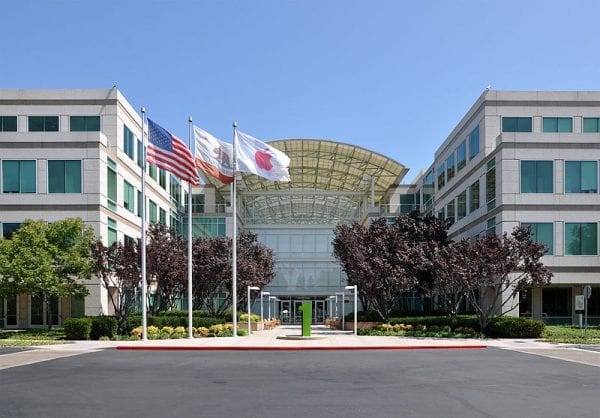
The Senate’s Bad Apple: Why Congress Should Focus on Tax Reform Instead of Vilifying Businesses
Taxpayers Protection Alliance
May 22, 2013

Apple HQ (courtesy Joe Ravi)
The Senate Permanent Subcommittee on Investigations thought it would be a good exercise to spend time, and taxpayer money, yesterday hauling in Apple executives Chief Executive Officer Tim Cook, Chief Financial Officer Peter Oppenheimer and Apple’s head of Tax Operations Phillip Bullock to question them about a report from the Subcommittee that says Apple kept billions in profits in Irish subsidiaries to pay little to no taxes to any government. Mr. Cook and the other witnesses representing Apple during yesterday’s hearing strongly rebuked charges that they did anything wrong or used any “gimmicks” in an effort to avoid paying what they owed in taxes, stating that “We pay all the taxes we owe, every single dollar” adding the company doesn’t “stash money on some Caribbean island.” In fact, Mr. Cook went further, presenting his own recommendations for reforming the complicated tax code including a reduction in the corporate tax rate suggesting a “dramatic simplification,” with an overhaul that should be “revenue neutral, eliminate corporate tax expenditures, lower overall tax rates and make it easier to bring money back from overseas.”
The real story here isn’t about a major corporation that follows the law and does exactly what is best for their company and their shareholders, but the fact that the tax code needs a complete makeover. In particular, yesterday’s hearing showed that corporate tax reform should be at the top of the list for reform. The Taxpayers Protection Alliance has been a strong advocate of reforming the tax code and simplification of the way both individuals and businesses file their taxes.
The first part of the tax code is the corporate tax rate. On April 1, 2013, the U.S. celebrated a somber anniversary, having the highest corporate tax rate amongst OECD nations, with an effective corporate tax rate of 39 percent.
The economy and job growth are harmed as a result of a high corporate tax rate and a complicated code. TPA has already called attention to a recent study showing U.S. GDP will be between 1.2 percent and 2.0 percent smaller in 2013 because of the country’s effective corporate tax rate of 39 percent.
The rate also deters foreign nations from investing in the US while at the same time encouraging companies located here to relocate. Beginning in 2000, during an 11-year period the U.S. lost a net of 46 Fortune Global 500 company headquarters to other, lower-tax countries in both Europe and Asia. These kinds of figures certainly lend credibility to why Apple CEO Tim Cook stated yesterday that he would like a top corporate tax rate in the “mid-20s” and a repatriation rate in the “single digits,” adding “I have no current plans to bring them back at the current tax rate,” referring to the more than $100 billion Apple keeps overseas.
In addition to CEO’s of successful companies, including Apple, calling for an overhaul, politicians on both sides of the aisle have acknowledged that a tax code overhaul needs to take place. This is good news and provides a glimmer of hope.
Even though it is encouraging that the Chairman of the House Ways & Means Committee, Dave Camp (R-Mich.), is continuing a strong push to overhaul the tax code and lower the corporate tax rate, it is important that the work continues and the momentum builds for a responsible simplification of the tax system that benefits individuals and businesses nationwide.
Two of the biggest problems with Washington are Washington’s inability to get things done, and get out of the way of businesses. Yesterday’s hearing by the Senate Permanent Subcommittee on Investigations was a perfect example of both of those problems. Hopefully, Congress can move past vilifying successful businesses and get to work over-hauling the tax code.
